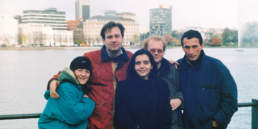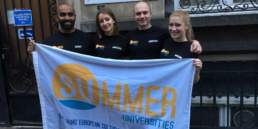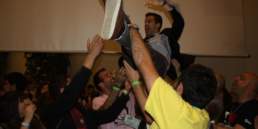24 years ago the first Summer Universities took place. For seven years, nearly one third of this long period, AEGEE’s biggest project was coordinated by Kamala Schütze. While the other SUCT members changed now and then, Kamala was the coordination team’s pillar of continuity for the longest part of the past decade. For this great work, Kamala was awarded honorary membership of AEGEE-Europe. The Golden Times asked her about her memories of her time in gthe SUCT.
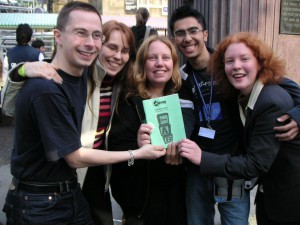
Golden Times: Kamala, when where you SUCT coordinator?
Kamala Schütze: It’s so long ago that I hardly remember. I was elected SUCT member at the Agora Udine in 2000 the first time.
Golden Times: From when to when were you in the SUCT?
Kamala: It was a pretty long time actually, longer than most people were members in AEGEE as such. I think it was around 6 or 7 years in a row.
Golden Times: That’s impressive! Before we continue, a few words about you: how old are you, where do you live, what do you work?
Kamala: I’m 33, living in Celle in Germany and working as a combination of training coordinator and human resources representative, areas in which I can apply quite a lot of what I learned and experienced during my active AEGEE time. In fact, I got my job thanks to that.

Golden Times: What was the first SU that you organised?
Kamala: The first SU that I organised was a Language Course in my city Gießen.
Golden Times: And the first one that you visited?
Kamala: The first SU that I visited was a TSU organised by Athina and Skopje. Unfortunately, I was so naive that I didn’t own a passport at that time because I believed I could go everywhere with my ID only. Sadly, I couldn’t join the Macedonian part of the TSU because of this, they simply didn’t let me into the country. The first thing I did being back home was to submit an inquiry for the issue of a passport. Since then I have no ID card anymore!
Golden Times: Oh, something similar happened to me when I travelled by train from Budapest to an AEGEE event in Skopje. I didn’t know that I needed a visa for Serbia. How come that you got involved in the SUCT? What motivated you?
Kamala: I became active on local level right away after I joined AEGEE in 1998. After some time, this was not enough and I wanted the bigger picture. And because I thought I was good in organising events, the Summer University Co-ordination Team seemed a good way. It was not as abstract as some working groups and commissions, allowed me to be active just with the means of a PC and Internet, and reached out to a multitude of people. But to be honest, it was also because there weren’t enough candidates and they made an open call during the Agora, so I saw good chances being elected – even though there were counter-candidates finally.
Golden Times: What were your best memories of your time in the SUCT?
Kamala: The best was to see that the changes that my team and I implemented paid off in the end. That was for example the implementation of the Summer Event, the Summer University Project School (SUPS) or the new selection tool and web page. I see that the Google map to visualise the dimensions of the project and the location of the various events is still used nowadays! But in general, it was just a great time because I had the chance to work with wonderful people, some of them are still my friends and we see each other regularly. They were as idealistic as I was and we could contribute to the success of this fantastic project.
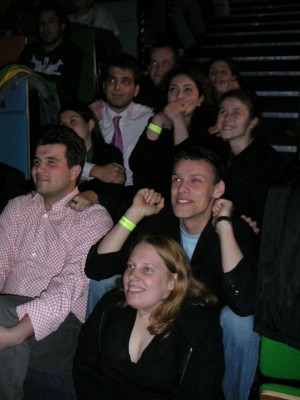
Golden Times: And what were your worst SUCT memories?
Kamala: A very bad moment was when we heard about the fatal accident during the SU in Tbilisi, where a girl came to death and a boy was badly injured. I know it was one of the darkest days of the project and I’m proud of the organisers and participants that they managed to cope with this tragedy. Unfortunately, the last year was the worst for me personally, and it’s still making me sad. I think we should have stopped at one time and leave the stage to the new generation. But we still had ideas that we wanted to realise, making the project more successful, reaching out much wider. It’s a shame we couldn’t keep our promise and for me it was one of the hardest times in my whole life as I had to admit that I was not able to fulfill my goals.
Golden Times: What happened?
Kamala: During the last year, all of us were already working and it was an illusion to think that we can invest as much of our time as during our studies. The real life simply overwhelmed me, especially when my father suddenly died from a heart attack… No, it was a bad year and it made me turn around and leave AEGEE completely. Well, maybe I would still be active and one of these dinosaurs if this didn’t happen. So I think, in the end it was better this way.
Golden Times: I’m very sorry to hear. How was the workload in the SUCT?
Kamala: It was as time consuming in the end as when I started in the SUCT. So the most intense time was when we had to check all the proposals for the events in the beginning of a year. It was lots of e-mailing and phoning to ensure that the defined standards of the project were respected and implemented everywhere and that all info was given, including a translation in the local language for the SU booklet. I remember that I was often sitting in the PC lab for more than 12 hours a day because at that time I had no Internet at home. Luckily, some technical changes that we implemented later with Fabrizio Fantini were facilitating the whole process a little and this way we had some more time for strategic issues.
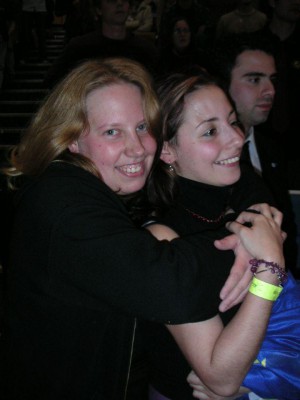
Golden Times: How did the number of Summer Universities develop over these years?
Kamala: The number was changing from year to year but usually around 80-90 events were organised with a steady amount of applicants.
Golden Times: Were there certain developments or trends of the content of Summer Universities?
Kamala: We saw a tendency that thematic events were not really thematic – for example there was only one hour dedicated to the topic. They were rather pleasure trips. We never wanted the SU to be reduced to this, so we decided to introduce the Summer Event. This way, there was still some standard, but at the same time locals had more flexibility to organise the event like they wanted. Also an initiative to raise the number of Language Courses paid out thanks to the collaboration with the European Day of Languages team. Generally, we seeked more synergies between the SU project and other bodies of AEGEE, like the Working Groups.
Golden Times: Were there developments regarding the administration of SUs, too?
Kamala: Yes. Another change that we saw was that locals preferred to raise the participation fee or implement an extra fee for excursions rather than trying to fundraise money. A tendency that could be observed for any event, not only within the SU project. Of course this was the easier way. It was a pity actually.
Golden Times: You were in contact with a lot of SU organisers, helped them a lot. Any particular anecdotes about that?
Kamala: Not really. I just liked being in touch with so many people, both organisers as well as applicants. It was sometimes hard to make them understand the ideals of the project and that it was not only to be seen as a cheap holiday. But when both organisers as well as participants reported their experiences, when you saw the pictures will all these smiling faces, when you watched a movie that had been created, that was simply great.
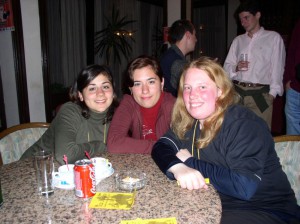
Golden Times: Which SUs do you remember as outstanding or role-model even for today?
Kamala (smiling): I would say those of AEGEE-Gießen. No, really, there were so many and there is not just that particular event. They were all diverse, which is the wonderful thing about the project. Of course it was a great moment to see the first SU being organised in Azerbaijan, even doing an Azeri language course.
Golden Times: How would you like to see Summer Universities develop in the future?
Kamala: Honestly, I have no idea how the project is doing nowadays. I almost completely cut all communication with AEGEE. There are already some things that I don’t understand like the new web page. I’m not even able to find the Address Book. I only hope that the active people from today kept some of the idealism, and didn’t become too commercial using the events to make money. The SU project is great and it helped so many people see parts of the world that are not the touristic spots per se. It is connecting people and makes them experience new things, learn new cultures and languages.

